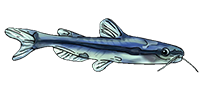help my catfish
-
catfish_q8
- Posts: 10
- Joined: 22 Jul 2005, 17:20
- Location 1: kuwait
- Interests: turtles
help my catfish
my catfishs mustach is cut , not all of them but only two of them!!and some whitesh thing is pealing off , anyone can help me
marafio
- MatsP
- Posts: 21038
- Joined: 06 Oct 2004, 13:58
- My articles: 4
- My images: 28
- My cats species list: 117 (i:33, k:0)
- My aquaria list: 10 (i:8)
- My BLogs: 4 (i:0, p:164)
- Spotted: 187
- Location 1: North of Cambridge
- Location 2: England.
If you mean the barbels (whiskers). They can get damaged from either sharp gravel or poor water quality. If you have got gravel/sand in the tank that is sharp to the touch, then it's probably no good for your fish either.
As to water quality, you'll want to have a test-kit that contain tests for:
- Nitrate (NO3) level.
- Nitrite (NO2) level.
- Ammonia (NH3/NH4) level.
Use the test-kit to check your water. You should have levels of nitrate showing, but no higher than about 50 ppm (mg/l) maximum. Ammonia and nitrite should not show up on the test, or something isn't working with the biological filtration (this works with "friendly" bacteria that convert the ammonia->nitrite->nitrate).
The biological filtration is built up as the tank is started from "empty", and will be depending on a fish (or other creature) creating ammonia in the tank. So if your tank is newly set up, this could still be going on (it can take more than 6 weeks to build up the bacteria).
If the tank and/or filter is too small, the setup can also have problems coping with the waste-products of the fish, which would cause spikes or elevated levels of nitrite and/or ammonia.
If you have high levels of ammonia (more than 1 ppm), you'll need to change part of the water (say 30%) each day, until the level is below 1ppm. Doing this will slow down the buildup of bacteria (bilogical filtration) that breaks down the waste-product of the fish, but will improve the "quality of life" for your fish.
--
Mats
As to water quality, you'll want to have a test-kit that contain tests for:
- Nitrate (NO3) level.
- Nitrite (NO2) level.
- Ammonia (NH3/NH4) level.
Use the test-kit to check your water. You should have levels of nitrate showing, but no higher than about 50 ppm (mg/l) maximum. Ammonia and nitrite should not show up on the test, or something isn't working with the biological filtration (this works with "friendly" bacteria that convert the ammonia->nitrite->nitrate).
The biological filtration is built up as the tank is started from "empty", and will be depending on a fish (or other creature) creating ammonia in the tank. So if your tank is newly set up, this could still be going on (it can take more than 6 weeks to build up the bacteria).
If the tank and/or filter is too small, the setup can also have problems coping with the waste-products of the fish, which would cause spikes or elevated levels of nitrite and/or ammonia.
If you have high levels of ammonia (more than 1 ppm), you'll need to change part of the water (say 30%) each day, until the level is below 1ppm. Doing this will slow down the buildup of bacteria (bilogical filtration) that breaks down the waste-product of the fish, but will improve the "quality of life" for your fish.
--
Mats




